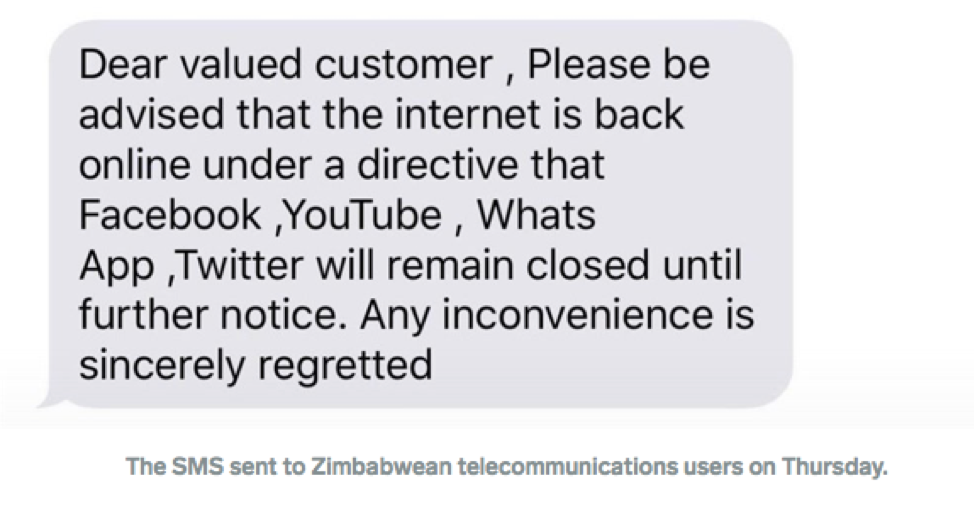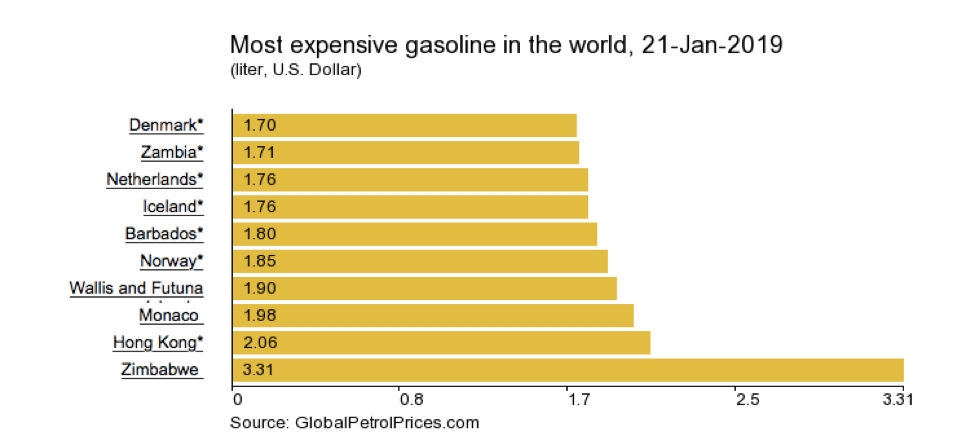In a move that would be the envy of any dictatorship, the government of Zimbabwe shut down the country’s internet last week following violent clashes with the military over fuel price hikes.
State Security Minister Owen Ncube ordered Econet Wireless, the country's largest provider, to pull the plug on the internet as security forces responded to protests.
At the time of the protests and shutdown, Zimbabwean President Emmerson Mnangagwa was attending the Davos summit of world leaders but still promised an investigation into security force violence.
Over the weekend, partial service was restored, but a blackout on social media apps was maintained, including for Facebook, WhatsApp and Twitter—and that ban remains in place today.
On Monday, the high court in Harare ruled that the government had no authority to shut down the internet and ordered it to be fully restored.

(Click to enlarge)
According to the opposition and activists, the ban is an attempt to suppress news and images of the unrest, noting that the government initially blamed “internet congestion” for the blackout before admitting that they viewed it as a "tool used to coordinate the violence."
The Arab Spring is still fresh in the minds of the Zimbabwean leadership, and it was lost on no one that social media helps organize protests.
Soldiers were deployed to major cities Harare and Bulawayo after the government decision to increase fuel prices. At least 12 people were shot by police and another 25 wounded during battles with protesters in the Zimbabwean capital Harare.
Moreover, the country’s major cities have been ravaged by demonstrations. Shops have been looted and destroyed, and police stations have been set on fire.
Authorities have launched a large-scale crackdown on suspected protestors and organizers of the nationwide strike. More than 600 people, including opposition members of parliament, have been arrested in connection with the protests. Related: Union Membership Hits Historic Low As Wage Gap Looms
One union leader, Japhet Moyo, was arrested on Monday as the opposition reported five lawmakers had been detained in recent days. He stands accused of plotting to overthrow the government in the wake of protests.
And the current government knows thing or two about overthrowing.
When in November 2017, almost four-decade-long ruler President Robert Mugabe sacked his first vice president, and current President Emmerson Mnangagwa, it caused country’s National Army to place Mugabe under house arrest. He resigned five days later. He had saddled the country with massive debt, leaving the majority of its 16 million inhabitants living below the poverty line or getting by only thanks to remittances from the diaspora. He left behind inflation that has now hit a decade high of 40 percent.
So a hike in fuel prices isn’t going to go down well—and it didn’t. Mnangagwa announced a double of fuel prices from $1.24 to $3.31 a liter—which would make Zimbabwe—which imports all of its petroleum--the most expensive country in the world to gas up.

(Click to enlarge)
Before heading to Davos, Mnangagwa visited Russia, Belarus, Kazakhstan and Azerbaijan trying to drum up foreign investment after South Africa turned it down for a $1.2-billion loan last month. in a bid to attract foreign investment.
Mnangagwa’s job at this point is an impossible one, but pulling the plug on the internet isn’t going to do the authorities any favors, even if it does make it harder for protesters to instantly organize. They’re not going anywhere.
By Charles Benavidez for Safehaven.com
More Top Reads From Safehaven.com
















